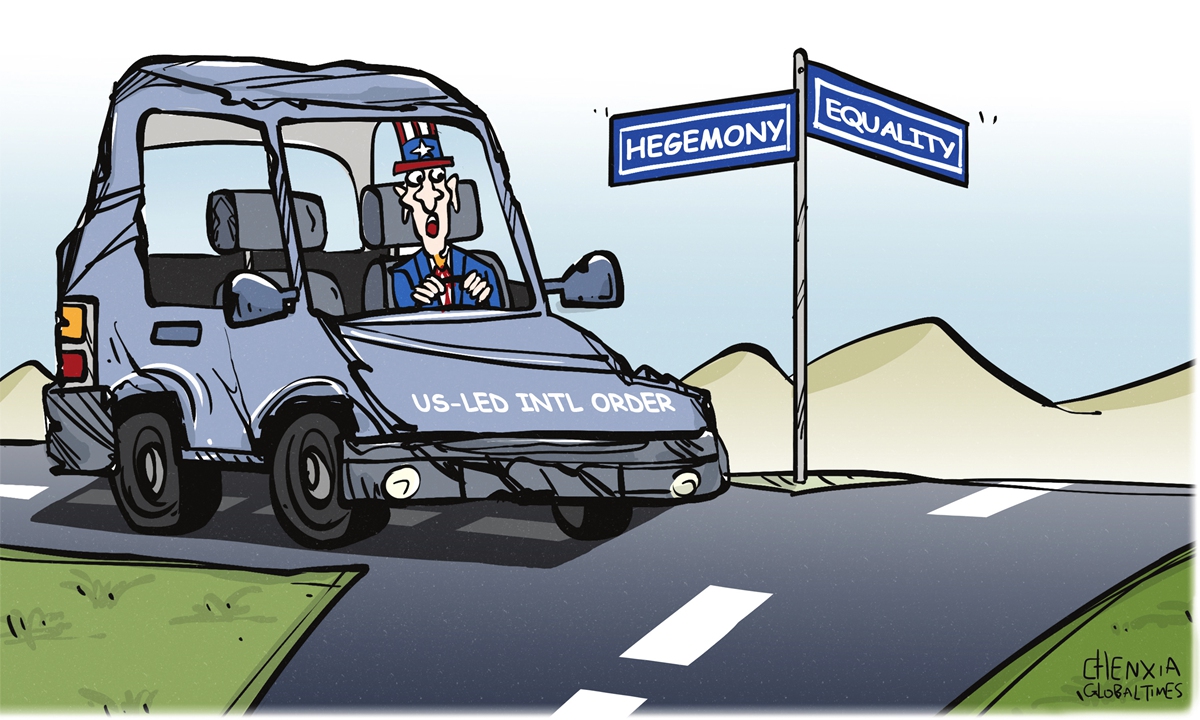
Illustration: Chen Xia/Global Times
"Undermining the international order" is often used by US politicians to attack countries that do not follow what Washington says. However, the US has adopted an increasingly overbearing approach to the existing international order, standing up for what is in its favor and overturning the table for what is not.
Whether in the United Nations or in the WTO, which now urgently needs reform, Washington's approach has constituted the greatest challenge to the existing international order.
This is exemplified by US Secretary of State Antony Blinken's statement on February 17 at the Munich Security Conference 2024 (MSC 2024), where he said that "if you're not at the table in the international system, you're going to be on the menu."
This metaphor was intended to emphasize the importance of the US actively participating in and shaping a new multilateral system. This approach has been interpreted by many strategic analysts as being aimed at China.
The metaphor of being "at the table" versus "on the menu" suggests that if the US does not proactively engage in the international system and even lead it, it risks being dominated by other countries. "So it was very important for us to re-engage multilaterally," Blinken clarified.
The crux of the matter is not who is at the table, but who gets to set it - who has the right to decide the order of the seats at the table.
Suppose we liken the "table" to the international order. In that case, China and other emerging economies have to sit at a table set by the US, implying that countries other than the US do not have the right to set the table.
However, in today's multipolar world under globalization, the right of emerging economies to participate in setting the table is crucial.
If the table is entirely controlled by the US, dictating who can sit at it and who cannot, and where they sit, it signifies a detrimental zero-sum game. For instance, the proposal by US President Joe Biden to establish the Chip 4 alliance between the US, Japan, South Korea and China's Taiwan island, demonstrates excluding the Chinese mainland from the table.
The struggle over the right to set the table limits the further evolution of the US hegemonic system. Recently, also at the MSC 2024, India's External Affairs Minister S. Jaishankar, in response to India's continued purchase of Russian oil during the Russia-Ukraine conflict, stated, "If I am smart enough to have multiple options, you should be admiring me," and then humorously asked Blinken and German Foreign Affairs Minister Annalena Baerbock beside him if this was a problem for others.
India's stance reflects the mind-set of many middle powers today. According to a study by the German Institute for International and Security Affairs (SWP) on 12 countries, namely India, Turkey, Israel, Egypt, Saudi Arabia, Kazakhstan, Indonesia, Ethiopia, Kenya, South Africa, Mexico and Brazil, these "middle powers" share common goals in economic development, security stability and strategic autonomy.
Clearly, the table these countries strive for differs from the one the US imagines or seeks to maintain. The most important rule of this table is equality among all, with the US not always being in a superior position. The basic rule of this table is that discussions should be based on system reforms that benefit common interests, not just the interests of the US.
The development of the global political, trade and economic order requires granting more benefits to emerging economies. Developed countries must make compromises, and the struggle over the table reflects a worldview.
China has consistently rejected Washington's "competitive view" because it is still based on a hegemonic status, aiming to suppress, contain and even block China's development. This strategy of containment against Beijing is Washington's global strategy.
If Washington cannot grant certain concessions to emerging economies, represented by China, then the table it sets cannot be stable.




